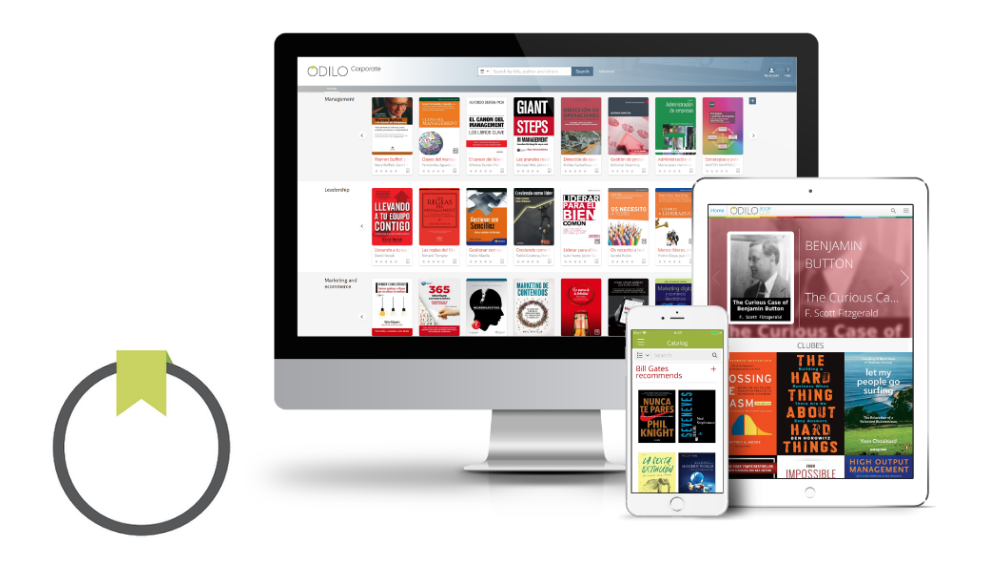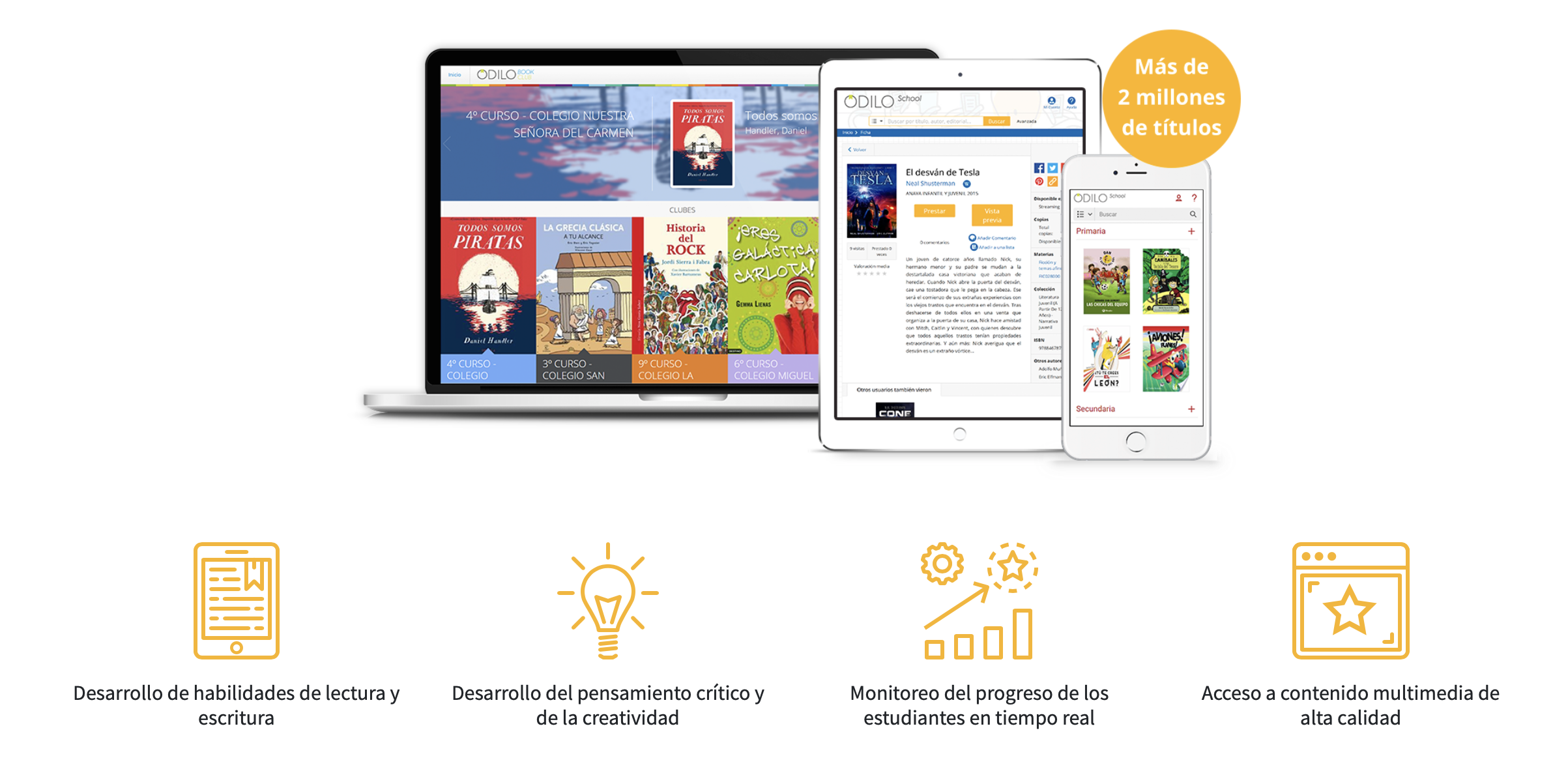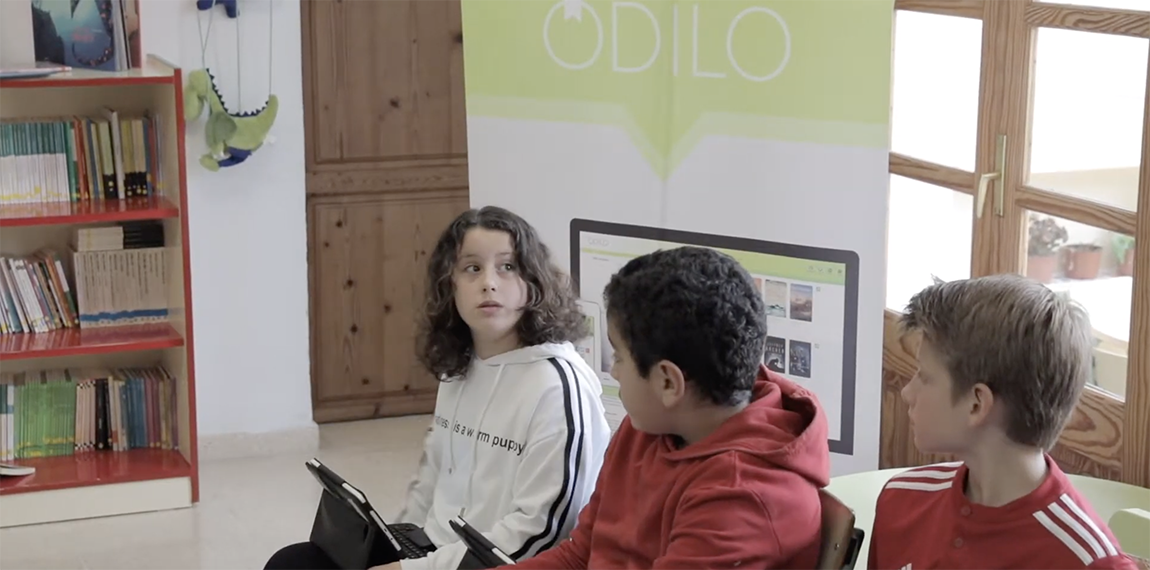Improving reading skills
Can you imagine a digital platform with millions of publications in various formats and languages that can be accessed both online and offline? What if, in addition, this same platform used data science to inform teachers of their students’ progress and to make content recommendations to students based on their tastes and reading comprehension level?
Odilo was created in pursuit of a dream: for students to relate to literacy in the same way as they do to other solutions in their digital environment. “We wanted to help create the habit of reading in students”, explains CEO Rodrigo Rodríguez we wanted them to be lifelong readers who want to read and learn proactively and help improve reading comprehension. And we do this by designing technology that adapts to the times: to how students communicate, to the kind of digital content they like to interact with, so that they are in an ecosystem that adapts to how they work and not the other way around.
“At Odilo, we strongly believe that technology should empower teachers, allowing them to eliminate superfluous tasks and giving them tools, data and technology so that they can focus on what machines can never do: to be a guide and support for students and families in the process of creating great readers and students with the goal and enthusiasm to learn new things”.
The Odilo digital literacy project aims to address educational inequality and low literacy levels, caused by a lack of access to quality educational content. How do they do it? Through smart digital libraries and learning solutions that, on the one hand, give access to better digital content and contribute to increasing students’ reading comprehension ability, and on the other hand, facilitate the work of the teacher, who can develop and design personalised reading plans, and allow families to be involved in the student’s reading process.
Odilo aims to address educational inequality and low literacy levels, caused by the lack of access to quality educational content.
A technological solution at the service of pedagogy
Odilo’s technology, which, as mentioned above, works both online and offline, is therefore suitable for environments with intermittent or no internet connection, and offers its users a learning experience with advantages for students, teachers and families. Thus:
- Students are provided with personalised digital content, receive personalised reading recommendations and have digital book clubs where they can share and generate knowledge;
- Teachers have a platform to create and manage reading plans and exercises to improve their students’ reading and writing comprehension.
- Families can use technology to monitor the reading and writing process and have specific content available, with the aim of parents becoming a family reading mentor.
But we already know that technology is only one part of the equation that must be used to support and improve teaching and learning. In this regard, Odilo promotes a pedagogical style based on principles that support the work of the different players involved in the educational process. How?
- To the teacher: Odilo enables teachers to improve the planning of their work by providing them with technology to manage and create lesson plans, freeing them from repetitive, low-value tasks and allowing them to focus on the learner, for whom they take on the role of guiding their learning.
- To each student: Odilo allows students to take the lead in their own learning by allowing them to choose supplementary content, monitor their reading process and have exercises to improve their reading and writing comprehension. This allows students to maximise their potential, gaining knowledge and developing 21st century skills such as critical thinking, collaboration and creativity.
- To families: Odilo offers families the opportunity to get involved and play a supportive and positive reinforcement role by reading specific content for the student, providing them with tools to promote the reading habit in their family and technology to monitor the progress of the student’s reading process.
In its teaching methodology, a gamification approach is a prominent feature, so that the student progressively increases their level of reading and writing according to their progress. Thus, the complexity of the texts varies according to each student’s learning pace. This approach also serves as a positive reinforcement to encourage a taste for reading so that the learner stays motivated and achieves his or her reading goals.
To support these methodological postulates that we have just explained, Odilo offers virtual reading clubs in which students share ideas and can build knowledge; creative and collaborative writing exercises that allow students to jointly rewrite different parts of the book they are reading, or chained writing exercises where each student, in turn, must complete his or her part of the story. It also has a system of smart content recommendations, based on the student’s tastes and reading comprehension level, to encourage the reading habit and maintain their interest and motivation for reading.
Teacher training
Teacher training, without which it is impossible to implement any educational technology project, is another of Odilo’s strong points; it includes face-to-face and/or virtual training sessions so that teachers can master the technical and educational delivery use of the platform. Teachers learn to create and publish their digital reading plans, to create new exercises, to analyse statistics on the use of the platform and to make pedagogical decisions accordingly… The training is supported by follow-up meetings, which take place during the implementation and development of the platform in the school, to resolve any doubts, discuss developments and identify best practices.
So far, more than 8,500 organisations in 52 countries have created their own unlimited learning ecosystems, to which more than 100 million people have access. A more than interesting digital learning solution to improve a basic competence that is not currently at its best.







